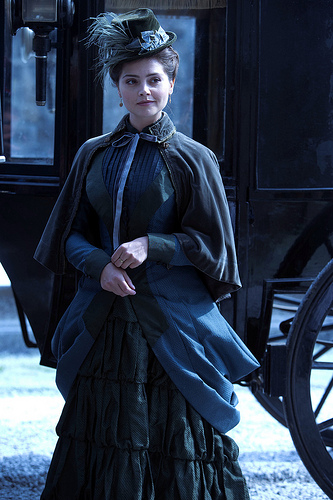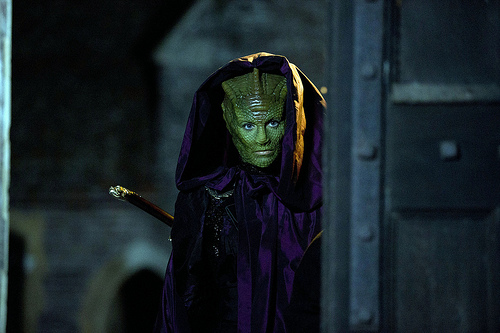Review: A Darker Fairytale For "Doctor Who" This Christmas
Warning: From here on out, there are spoilers for the 2012 "Doctor Who" Christmas Special, "The Snowmen".
The Doctor is out.
After "The Angels Take Manhattan", in which Amy and Rory Williams (Karen Gillan, Arthur Darvill) made their final adieu, the Doctor (Matt Smith) has "retired" from the planet-saving trade, instead tending to self-imposed isolation bred from guilt and grief. But it's Christmas! We expect jolly jaunts through space and time, some explosions, potential genocide—all-in-all, a feel-good episode that may start out tragically but end happily enough, imparting some greater wisdom unto the young fans—
This is not that episode. While the "Doctor Who" Christmas specials have tended toward darker themes in the past few years, none have been so outwardly bleak as this one.

50 years later, the year is 1892, and that young boy is now Dr. Walter Simeon. Quite clearly the "villain" of the episode, the man feeds a group of hungry laborers to his army of carniverous snowmen within the first ten minutes. He takes orders from his former-snowman, now-snowglobe; he plots to destroy the whole of humanity for whatever reason. He has snowmen, with teeth, who eat people, because "Doctor Who" has a long-standing tradition of making its viewers unreasonably terrified of inanimate objects, such as stone statues or store mannequins.
Scary but also laughable monsters, a sinister villain with a dastardly plan that involves wiping out the whole of humanity—your average "Doctor Who" episode. Except where is the Doctor?

The Doctor is broken, but enter Clara (Jenna-Louise Coleman), a governess who moonlights as a barmaid, one with an insatiable curiosity and a knack for storytelling, who, as the new companion to the once-ebullient Eleventh Doctor, must try to fix him.
Coleman, who played Oswin Oswald, the soufflé-making human/Dalek convert from "Asylum of the Daleks", was announced as the new companion this summer, but when her character made a surprise appearance in the first episode of the series, only to sacrifice herself for the Doctor and the Ponds, viewers were perplexed.
Throughout the episode, various storybook themes seem to poke through—at first, it appears that Clara is Belle from "Beauty and the Beast", making the melancholy, nasty Doctor the "Beast", whose curse of self-condemnation must be broken before they can start anew. As she fixes him, he can fix the situation at hand, the imminent demise of the human race. As the episode progresses, she incorporates themes from "Mary Poppins" (a Victorian governess to two children, who tells fantastical stories, uses an umbrella, and potentially travels through time) and other stories.
Clara is cheeky and charming, and she takes charge—she does not let the Doctor overpower her, and Coleman's character has more spitfire than most past companions. She's delightfully funny, adorable and witty; like her predecessor Oswin, she keeps up a flirty banter with him, even kissing him at one point. After going up a literal stairway to heaven and seeing the Doctor's invisible castle in the sky, she is showed the TARDIS for the first time and observes that it is not "bigger on the inside", but "smaller on the outside", surprising viewers and the Doctor alike with the break from the norm.
But just as the "old" Eleven begins to break through, she is pulled out of the TARDIS and falls down to London underneath the clouds, leaving her with near-fatal injuries, in a "Sleeping Beauty"-like unconsciousness. Although the Doctor fights to keep her alive while trying to fend off the Simeon's snowmen, it is by her death that the plan is foiled. When she dies, the family she works for begins to cry, melting the snow into saltwater tears.
As the Doctor watches her funeral, he sees that her headstone reads "Clara Oswin Oswald" and the name strikes a bell. In "Asylum of the Daleks", he could only hear Oswin's voice, not see her, and all the pieces begin to make sense: Clara had asked about a kitchen in the TARDIS because she likes to make soufflés, her last words were even the same:
Run, you clever boy, and remember me.
As he dashes off to the TARDIS to search for her, we flash-foward to what appears to be present day, and two young women are exploring that very same graveyard; one stops in front of Clara's grave, and, turning back to her friend, reveals Jenna-Louise Coleman again, twice dead, with all customary sass in tact.

As for writer Steven Moffat, he referenced his other favorite boyhood calling, the "Sherlock Holmes" stories, much to the delight of the fans of both the Arthur Conan Doyle stories and Moffat's show "Sherlock". He does, however, insinuate that Holmes and Watson are actually a crime-solving lesbian alien/human couple, and I'm sure Doyle is rolling in his grave.
The direction, by Saul Metzstein deserves commendation—while the concept of the TARDIS floating atop the clouds of London is magical in imagination, the images create a fairytale-like quality that extends throughout the episode. In addition, the music truly made the episode; the soundtrack, which is always good, seemed particularly brilliant (especially when taking into account the "Sherlock" theme variations that played during all the "Sherlock Holmes" references).
For the classic "Who" fan, viewers may recognize the names of the Big Bads of the episode, Dr. Simeon and the Great Intelligence Institute, as enemies from the Second Doctor episodes "The Abominable Snowman" and "The Web of Fear". While Dr. Simeon apparently dies (you never can tell with this show) in the episode, the Greater Intelligence Institute lives on, a possible story arc for series seven.
So this raises the questions: just who is Clara Oswin Oswald? And what is the Great Intelligence Institute?
Until then, the question "Doctor who?" will just have to wait.
Reach Staff Reporter Christine Bancroft here.



